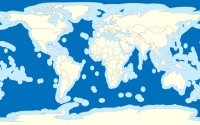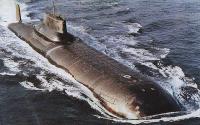News: By Source

The Pentagon sent a warship through the South China Sea on Tuesday in another operation meant to counter China’s territorial claims to artificial islands there, as relations between the two nations grow increasingly strained over the international dispute.
[ More ]
Royal Dutch Shell PLC is days away from drilling in the Arctic Ocean—betting it can find enough oil to justify the huge risks that keep almost every other competitor out of those icy waters.
[ More ]
In response to China's aggressive claims in the South China Sea, the U.S. has been shifting its own focus to the legal domain. It is insistent that when it comes to maritime rights and access to natural resources, the law that truly matters is international law even though the U.S. position is significantly weakened by its non-party status to UNCLOS.
[ More ]
With tensions rising between Russia and Western powers, the U.S. held submarine exercises in the Arctic Ocean - the body of water where the Russian and U.S. subs are likeliest to encounter each other.
[ More ]
The 40-year-old Coast Guard icebreaker Polar Star returned to the Arctic Ocean this summer after seven years in semiretirement, charging into a thinning polar ice sheet that U.S. defense officials predict will give way to new commercial waterways and a resource-rich frontier by midcentury.
[ More ]
Scientists in Japan and the U.S. say they are moving closer to tapping a new source of energy: methane hydrate, a crystalline form of natural gas found in Arctic permafrost and at the bottom of oceans.
[ More ]
The Arctic Council, a once-obscure regional forum that had little to show for itself, has nations queuing to participate, as melting ice makes shipping, tourism and resource extraction a reality in the nebulously delineated region.
[ More ]
Senate Democrats’ hopes of passing the Law of the Sea Treaty sank Monday, when a pair of Republican senators announced their opposition to ratification. Sens. Rob Portman of Ohio and Kelly Ayotte of New Hampshire penned a letter to Senate Majority Leader Harry Reid (D., Nev.) saying, “we have concluded that on balance this treaty is not in the national interest of the United States.”
[ More ]
In his testimony before the Senate Foreign Relations Committee last month, former Defense Secretary Donald Rumsfeld urged legislators to reject the 30-year-old Law of the Sea Treaty, saying it would force the United States "to pay royalties to less productive countries, based on rhetoric about the common heritage of mankind." Astonishingly, Mr. Rumsfeld's Senate testimony contradicts the advice his own Defense Department gave President George W. Bush in the early 2000s. The former defense secretary seemed to be in a time warp, harking back to his mission of 30 years ago during the Reagan presidency, completely dismissing the treaty's 1994 renegotiation.
[ More ]
Former Secretary of Defense Donald Rumsfeld argues that "as the U.S. Senate again considers approving this flawed agreement, the Reagan-Thatcher reasons for opposition [to UNCLOS\ remain every bit as persuasive."
[ More ]